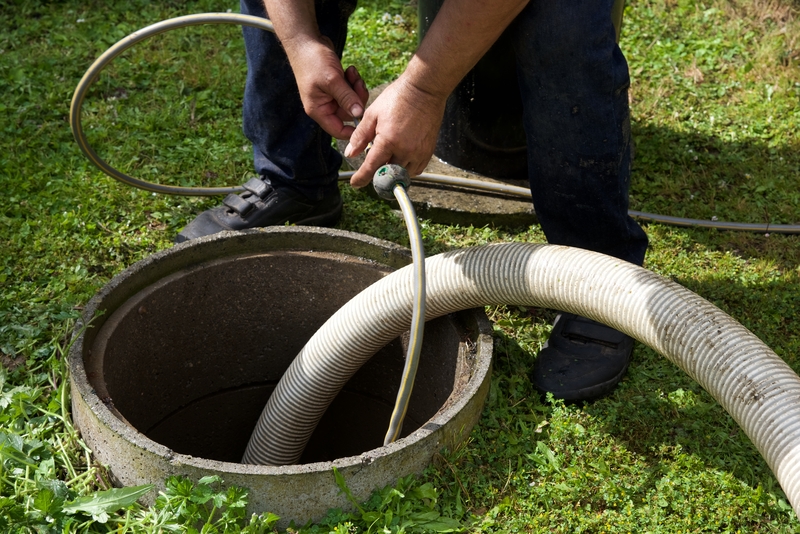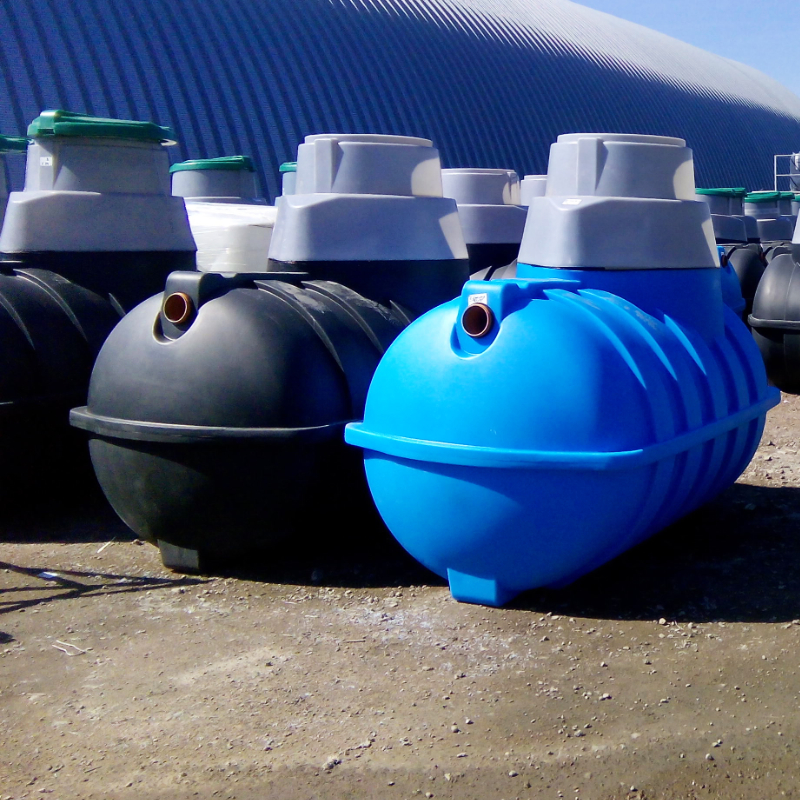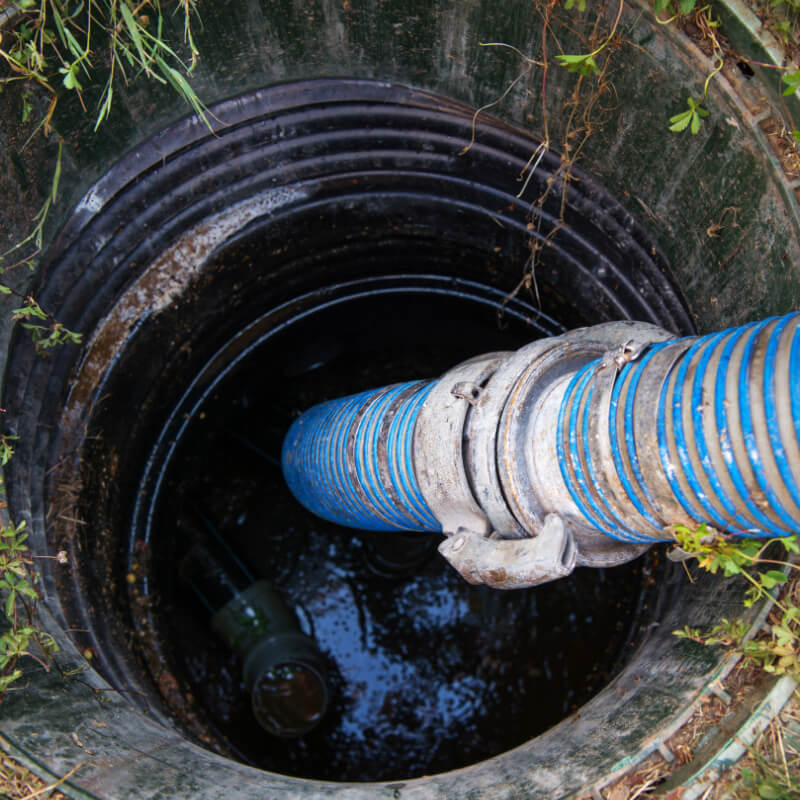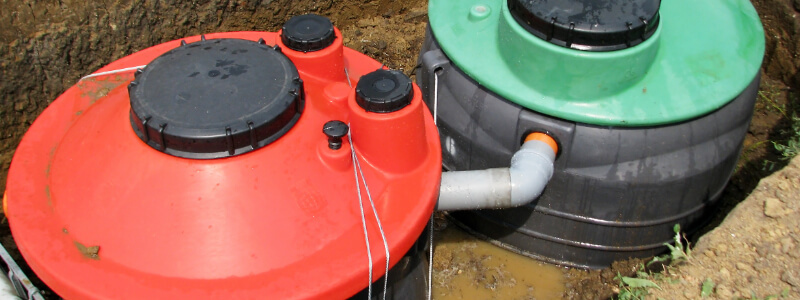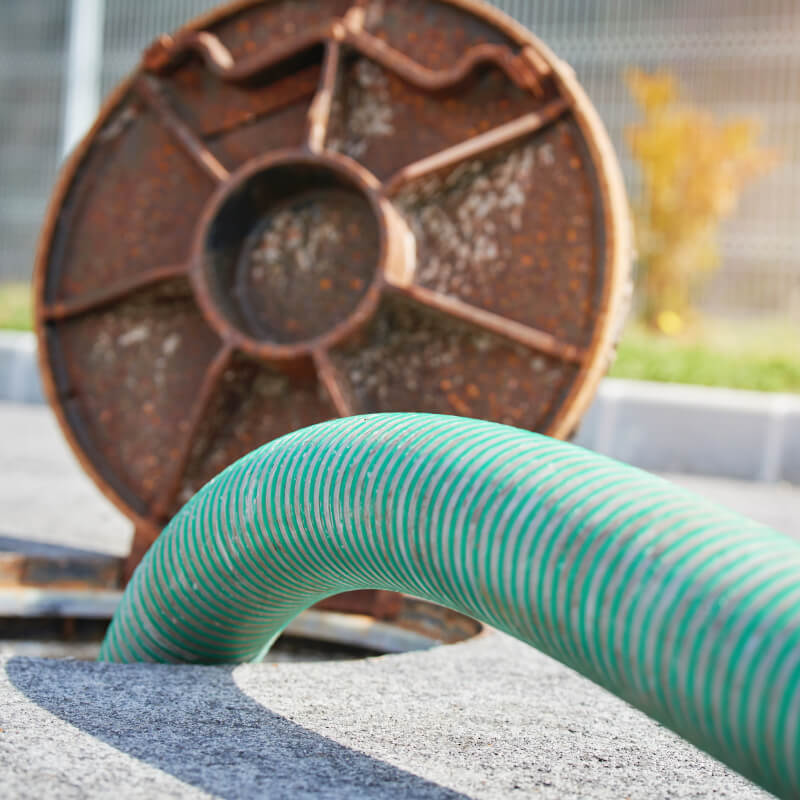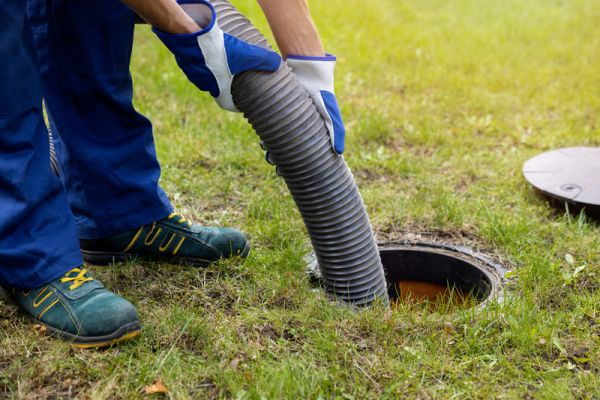In this article
What are the consequences of not inspecting a septic tank?
Septic tanks play a crucial role in wastewater treatment for properties and homes that are not connected to larger sewage treatment plant systems. These underground structures collect, treat, and dispose of household wastewater, ensuring the safe removal of contaminants before returning clean water to the environment.
Regular inspections are vital for maintaining the health and functionality of septic systems, as they allow for the early detection of potential issues, ensure proper operation, and prevent repairs. So, what would happen if you didn't get your septic tank inspected? In this blog, we'll take a look at septic tank inspections, why they're important, and what consequences may arise from not keeping up to date with them.
The Importance of a Septic Tank
Before understanding the importance of septic tank inspections, you must know why septic tanks are so important. Not only does a septic tank play a crucial role in managing domestic sewage, but these tanks also have a fantastic effect on your home and the surrounding environment. Let's look at some positive impacts of shallow dig septic tanks.
Wastewater Treatment:
A septic tank treats household wastewater by separating solids, oils, and grease from the water. This process helps break down organic matter through bacterial action, reducing harmful pathogens before the effluent is released into the drain field for further treatment.
Environmental Protection:
Properly functioning septic tanks prevent untreated wastewater from contaminating groundwater, surface water, and soil. By treating sewage on-site, septic tanks help protect the environment from pollution and safeguard public health.
Cost-Effective Solution:
Installing and maintaining a septic tank is often cost-effective for homeowners in rural or decentralised areas. It eliminates the need to connect to centralised sewer systems, reducing infrastructure costs and monthly utility bills.
Independence:
A septic tank gives homeowners independence from municipal services, giving them control over their wastewater management. This self-sufficiency is advantageous in remote locations or areas with limited access to public utilities.
Longevity:
With proper maintenance and regular inspections, septic tanks can have a long lifespan and effectively manage household wastewater for years. Routine pumping, monitoring, and care ensure the system operates efficiently and prevents costly repairs or replacements.
Property Value:
Well-maintained septic systems can add value to a property. Buyers often view an appropriately functioning septic tank as a desirable feature that indicates responsible homeownership and environmental stewardship.
What are septic tank inspections?
Septic tank inspections are thorough evaluations of the components and functionality of a septic system to ensure proper operation and compliance with regulations. The inspection is to assess the condition of the septic tank, distribution box, pipes, and drain field to identify any signs of damage, leaks, blockages, or malfunction that could impact the system's performance.
- Professional Inspection: It's advisable to hire a qualified professional, such as a septic tank service provider or inspector, to conduct a thorough inspection. They have the expertise and tools to effectively assess the tank, its components, and the overall system.
- Components Checked: During an inspection, various components of the septic system are checked, including the tank itself, distribution box, baffles, inlet and outlet pipes, drain field, and soil absorption area. The inspector looks for signs of damage, leaks, clogs, and other issues that could affect the system's performance.
- Tank Pumping: In addition to inspections, septic tanks need periodic pumping to remove accumulated solids and prevent blockages. The inspector may recommend pumping based on the tank's condition and the accumulation of sludge and scum layers.
- Maintenance Recommendations: Based on the inspection findings, the inspector may provide recommendations to ensure the septic system operates efficiently. This could include pumping schedules, repairs, upgrades, or adjustments to prolong the system's lifespan.
- Compliance and Regulations: Inspections help homeowners ensure their septic systems comply with local regulations and environmental standards. Regular inspections can prevent violations and potential fines for malfunctioning or contaminated septic systems.
Regular inspections are recommended to ensure the septic tank is functioning correctly. The frequency of inspections can vary depending on factors such as the tank size, household size, and usage. Typically, inspections should be conducted every 3 to 5 years.
What are the benefits of these inspections?
Regular septic tank inspections offer numerous advantages that contribute to the system's proper functioning, cost savings, and environmental protection.
- Early Issue Detection: Regular inspections enable early detection of potential issues within the septic system, such as leaks, blockages, or mechanical failures. Identifying problems at their initial stages allows for prompt repairs, preventing more significant issues from developing and ensuring the system's longevity.
- Cost Savings: By addressing minor issues through regular inspections, homeowners can avoid costly repairs or system replacements that may arise from neglected maintenance. Proactive maintenance is often more affordable than emergency repairs, helping homeowners save money in the long run and preserve the value of their property.
- Prevent Property Damage: Timely inspections help prevent property damage associated with septic system failures, such as backups, overflows, or contamination. By maintaining an appropriately functioning septic system, homeowners can protect their property from structural degradation, landscaping destruction, and other costly damages - ensuring a reliable septic tank for the home.
- Environmental Protection: Regular inspections are crucial in safeguarding the environment by preventing untreated wastewater from contaminating groundwater, surface water bodies, and soil. By ensuring that the septic system operates efficiently and complies with regulations, homeowners contribute to environmental conservation and reduce the risk of pollution.
- Compliance with Regulations: Proactive inspections help homeowners comply with legal requirements and septic system management regulations. By meeting inspection mandates and maintaining a well-functioning septic system, homeowners avoid potential fines, penalties, or legal issues associated with non-compliance.
- Peace of Mind: Regular inspections provide homeowners with peace of mind, knowing that their septic system is operating effectively and posing no risks to their health, property, or the environment. Maintaining a proactive approach to septic tank care ensures residents' safe and healthy living environment.
So, what can happen if you fail to inspect these sewage tanks?
Regular inspections help identify issues early, prevent system failures, protect water quality, and ensure regulatory compliance, ultimately safeguarding health and property values. But what can happen when these checks aren't done? Neglecting regular septic tank inspections can lead to various detrimental consequences for you and the health and safety of everyone and everything around you.
Increased Risk of System Failure
- Backups and Overflows: Without regular inspections and maintenance, a septic tank is more prone to backups and overflows. Accumulated solids and sludge can clog the system, leading to sewage backing up into the house or surfacing on the property, creating sanitation issues and health hazards.
- Damage to Drainfield: Neglected septic tanks risk damaging the drain field, which disperses treated wastewater into the soil. System failure can result in the drain field becoming saturated or clogged, leading to ineffective wastewater treatment and potential environmental contamination.
- Contamination of Groundwater: A failing septic tank, due to neglect, can contaminate groundwater with untreated sewage and harmful pathogens. This contamination poses risks to both human health and the environment, as polluted groundwater can impact drinking water sources and local ecosystems.
- Odour Issues: Neglected septic tanks may emit foul odours indoors and outdoors, affecting the quality of life for residents and potentially causing discomfort. These odours can signal system failure and should not be ignored.
- Structural Damage: Lack of maintenance and inspections can damage the septic tank, drainage field pipes, or components. Cracks, leaks, or deterioration of the system's infrastructure can lead to inefficiencies in wastewater treatment and eventual system failure.
- Contaminated Soil: Untreated wastewater leaking from a failing septic system can contaminate the surrounding soil, posing health risks and necessitating soil remediation measures. Contaminated soil may require excavation, removal, and replacement, resulting in significant property damage and expenses.
- Landscaping Destruction: The saturation of the drain field due to a neglected septic tank can lead to the destruction of landscaping and vegetation on the property. Over time, standing water and sewage exposure can kill grass, plants, and trees, requiring landscaping restoration efforts.
- Property Depreciation: Persistent issues stemming from neglected septic tank inspections can impact the property's overall value. Property depreciation may occur due to unresolved septic system problems, disclosure requirements for potential buyers, and the need for costly repairs to rectify the situation.
Health Hazards
Neglecting regular inspections of septic tanks can lead to significant health hazards associated with malfunctioning systems. When septic systems fail due to a lack of maintenance and inspections, untreated wastewater containing harmful bacteria, viruses, and pathogens can contaminate the surrounding soil and water sources.
- Waterborne Diseases: Untreated wastewater from a malfunctioning septic system can contain harmful pathogens such as bacteria, viruses, and parasites. Exposure to these contaminants through contaminated water sources can result in illnesses like gastrointestinal infections, hepatitis, and skin infections.
- Respiratory Issues: Malfunctioning septic systems can emit foul odours, including toxic gases like methane and hydrogen sulfide. Prolonged exposure to these gases can irritate the respiratory tract, leading to symptoms such as coughing, difficulty breathing, and worsening of respiratory conditions.
- Skin Irritations: Contact with untreated sewage or polluted water from a failing septic system can cause skin irritations, rashes, and infections. The presence of harmful bacteria and chemicals in the wastewater increases the risk of skin-related health issues upon exposure.
- Airborne Contaminants: Inadequately treated wastewater can release airborne contaminants into the surrounding environment, affecting indoor air quality. Inhalation of these contaminants can trigger allergies, respiratory problems, and other adverse health effects.
- Vector-Borne Diseases: Stagnant water pools around a neglected septic tank can attract pests like mosquitoes and flies, increasing the risk of vector-borne diseases such as malaria, dengue fever, and West Nile virus.
Environmental Impact
- Water Contamination: Untreated wastewater from a failing septic system contains harmful pathogens, nutrients, and chemicals that can contaminate groundwater and nearby surface water bodies. This contamination can render water unsafe for consumption and recreational use, impacting human health and aquatic life.
- Eutrophication: The influx of excess nutrients like nitrogen and phosphorus from untreated wastewater can lead to eutrophication in water bodies.
- Habitat Destruction: Contaminants from failing septic systems can degrade aquatic habitats by altering water quality and introducing toxins into the environment. Wildlife dependent on these habitats may suffer adverse effects, including decreased reproduction rates and habitat loss.
- Bioaccumulation: Toxic substances present in untreated wastewater can bioaccumulate in the food chain, affecting aquatic organisms and terrestrial predators that rely on contaminated prey.
- Groundwater Pollution: Leaking or overflowing septic systems can introduce pollutants into the groundwater, contaminating drinking water sources for nearby communities. This directly risks public health and necessitates costly remediation efforts to restore water quality.
Important Legal Considerations
Neglecting to inspect septic tanks can have serious legal implications, potentially leading to non-compliance with regulations and the imposition of fines or penalties.
- Regulatory Requirements: Many jurisdictions have regulations that mandate regular inspections and maintenance of septic systems to ensure public health and environmental protection. By neglecting these inspections, homeowners may be violating local, state, or federal regulations governing septic system management.
- Environmental Violations: Failing to inspect septic tanks can result in environmental violations if untreated wastewater contaminates soil, groundwater, or surface water bodies. This pollution can contravene environmentalprotection laws and regulations, leading to legal consequences for the property owner.
- Public Health Concerns: Neglected septic tanks pose risks to public health, as untreated sewage can contain harmful pathogens that endanger the well-being of residents and communities. Non-compliance with health and sanitation regulations due to inadequate inspections can result in legal action and health code violations.
- Fines and Penalties: Authorities may impose fines, penalties, or enforcement actions on homeowners who neglect septic tank inspections and promptly fail to address system failures. These fines can vary in severity depending on the extent of non-compliance and the potential harm caused by the neglected septic system.
- Property Sale Restrictions: In some areas, non-compliance with septic system regulations may restrict the sale or transfer of the property. Estate transactions often require proof of these shallow dig tanks or septic system inspection compliance, and failure to meet these requirements can complicate property sales and lead to legal disputes.
Final Thoughts
Neglecting septic tank inspections can have far-reaching consequences that impact homeowners, the environment, and the community at large. The risks of neglect are significant from health hazards and system failures to property damage and legal implications.
By conducting proactive inspections, homeowners can benefit from early issue detection, cost savings, environmental protection, compliance with regulations, and peace of mind. Maintaining the functionality and longevity of septic systems through regular inspections is a wise investment in property maintenance and a responsible choice for safeguarding health, property value, and the environment.
Cotswold Drainage
For any information on our shallow dig septic tank options, to learn more about sewage treatment plants or for any enquiries regarding your septic tank and septic drain field, please contact us. A member of our team will get in touch with you as soon as possible.
Get in touch
Contact our friendly and professional team via form, phone or email for any drainage issues you may have.
From blocked drains to septic tank repairs and replacements, we're here to help. We have over 25 years of experience and offer 24/7 emergency callouts.
-
01386 882324
-
WhatsApp
-
This email address is being protected from spambots. You need JavaScript enabled to view it. -
See what our customers think
